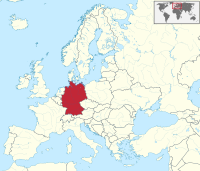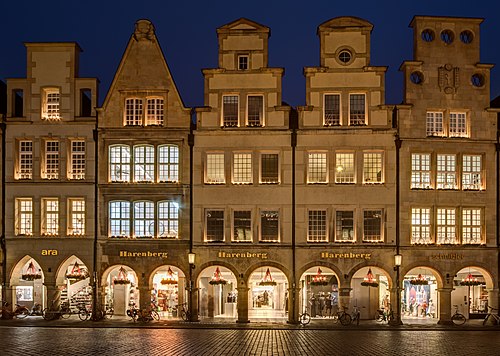Welcome to the Germany Portal!
Willkommen im Deutschland-Portal!

|

|

| |
Germany (German: Deutschland), officially the Federal Republic of Germany, is a country in Central and Western Europe, lying between the Baltic and North Seas to the north and the Alps to the south. It borders Denmark to the north, Poland and the Czech Republic to the east, Austria and Switzerland to the south, France to the southwest, and Luxembourg, Belgium and the Netherlands to the west.
Germany includes 16 constituent states, covers an area of 357,578 square kilometres (138,062 sq mi) and has a largely temperate seasonal climate. With 83 million inhabitants, it is the second most populous state of Europe after Russia, the most populous state lying entirely in Europe, as well as the most populous member state of the European Union. Germany is a very decentralized country. Its capital and largest metropolis is Berlin, while Frankfurt serves as its financial capital and has the country's busiest airport.
In 1871, Germany became a nation-state when most of the German states unified into the Prussian-dominated German Empire. After World War I and the Revolution of 1918–19, the empire was replaced by the parliamentary Weimar Republic. The Nazi seizure of power in 1933 led to World War II, and the Holocaust. After the end of World War II in Europe and a period of Allied occupation, two new German states were founded: West Germany, formed from the American, British, and French occupation zones, and East Germany, formed from the western part of the Soviet occupation zone, reduced by the newly established Oder-Neisse line. Following the Revolutions of 1989 that ended communist rule in Central and Eastern Europe, the country was reunified on 3 October 1990.
Today, Germany is a federal parliamentary republic led by a chancellor. It is a great power with a strong economy. The Federal Republic of Germany was a founding member of the European Economic Community in 1957 and the European Union in 1993. Read more...
Selected article

The Brazil vs Germany football match (also known by its score as 7–1) that took place on 8 July 2014 at the Mineirão stadium in Belo Horizonte was the first of two semi-final matches of the 2014 FIFA World Cup.
Both Brazil and Germany reached the semi-finals with an undefeated record in the competition, with the Brazilians' quarter-final with Colombia causing them to lose forward Neymar to injury, and defender and captain Thiago Silva to accumulation of yellow cards. Despite the absence of these players, a close match was expected, given both teams performed comparably well throughout the tournament. Also, both were regarded as two of the biggest traditional FIFA World Cup forces, sharing eight tournaments won and having previously met in the 2002 FIFA World Cup Final, where Brazil won 2–0 and earned their fifth title. (Full article...)
Selected picture
Related portals
- Parent portals
- Regional
- History
 Holy Roman Empire (900–1806)
Holy Roman Empire (900–1806) East Germany (1949–1990)
East Germany (1949–1990)
- Neighbouring countries
Anniversaries for June 9

- 1810 – Birth of composer Carl Otto Nicolai
- 1812 – Birth of astronomer Johann Gottfried Galle, one of the discoverers of Neptune
- 1881 – Birth of navy officer and author Felix von Luckner
- 1959 – Death of chemist Adolf Otto Reinhold Windaus, recipient of the 1928 Nobel Prize in Chemistry
- 1978 – Birth of football forward Miroslav Klose
Did you know...
- ... that Samuel Kummer chose for his first recital as the organist of the restored Frauenkirche in Dresden music by Bach, Brahms, Max Reger, Louis Vierne, and himself?
- ... that over the course of several decades, the missionaries of New Zealand's German Mission House failed to convert a single person?
- ... that German factory worker Julius Welschof now plays in the National Football League?
- ... that Peter Demetz, who taught German literature at Yale University from 1956 to 1991, was born in Prague where he was persecuted under the Nazis and escaped the Communist regime in 1949?
- ... that the Lutheran St. Trinitatis in Wolfenbüttel, consecrated in 1719, is a Baroque church with a facade recalling that of a palace?
- ... that Romani Holocaust survivor Philomena Franz wrote about her deportation to Auschwitz, internment in Ravensbrück, escape from a camp near Wittenberge, and concealment by a farmer?
- ... that baritone Liviu Holender chose lieder by five composers whose music was banned by the Nazis—Schreker, Zemlinsky, Mahler, Korngold and Schönberg—for a recital at the Oper Frankfurt?
- ... that ancient humans cared for a 14,000-year-old puppy?
Selected cuisines, dishes and foods

Due to its centuries-old history as a major port town the cuisine of Hamburg is very diversified and sapid as ingredients' supply was safe. Until the 20th century, the cuisine of Hamburg was predominantly characterized by the extensive choice of different kinds of fish from the river Elbe and the nearby Baltic Sea. The region of Vierlande supplied Hamburg with fresh vegetables. Fruit came from the area Altes Land and until industrialization the neighbourhood of Wilhelmsburg was considered the ‘milk isle’ of Hamburg. International trade in the Port of Hamburg made spices and exotic nutrition items from India and South America available since the 16th century, which were soon incorporated into civic kitchens.
On this basis, the cuisine of Hamburg developed which regrettably lost some of its characteristics nowadays due to the supraregional harmonization of the North German cuisine. But due to its high economic importance, Hamburg does feature many internationally recognized gourmet restaurants from which 11 were repeatedly awarded with a Michelin star in 2010. (Full article...)Topics
Categories
Things you can do

A list of articles needing cleanup associated with this project is available. See also the tool's wiki page and the index of WikiProjects.
Here are some tasks you can do. Please remove completed tasks from the list.
- Requests: Columbiahalle, German Archaeological Institute at Rome, Deutsche Familienversicherung, Dietlof von Arnim-Boitzenburg, Rolf von Bargen, Micky Beisenherz, Hennes Bender, Georg Bernhard (1875–1944), Eduard Georg von Bethusy-Huc, Rolf Brandt (1886–1953), Jan Philipp Burgard, Georg Arbogast von und zu Franckenstein, Georg Gafron, Ferdinand Heribert von Galen, Gundula Gause, Karl-Heinz Hagen, Herbert Helmrich, Nils von der Heyde, Monty Jacobs (1875–1945), Hans Katzer, Siegfried Kauder, Matze Knop, Wolfgang Kryszohn, Claus Larass, Isidor Levy (1852–1929), Markus Löning, Anke Plättner, Hans Heinrich X. Fürst von Pless, Gerd Poppe, Victor-Emanuel Preusker, Günter Prinz, Hans Sauer (inventor), Franz August Schenk von Stauffenberg, Paul Schlesinger (1878-1928),Oscar Schneider, Hajo Schumacher, Otto Theodor von Seydewitz, Dorothea Siems, Werner Sonne, Anton Stark, Udo zu Stolberg-Wernigerode, Christoph Strässer, Torsten Sträter, Joseph von Utzschneider, Jürgen Wieshoff, Hans Wilhelmi, Alexandra Würzbach
- Unreferenced: Unreferenced BLPs, Bundesautobahn 93, Benjamin Trinks, Steeler (German band), Amelie Beese, Zoologisches Museum in Kiel, Emil Krebs, Prussian semaphore system, Partenstein, Peter Krieg, Porsche 597, Christa Bauch, Curt Cress, Stefan Beuse
- Cleanup: 53541 issues in total as of 2024-03-03
- Translate: Articles needing translation from German Wikipedia
- Stubs: Albersdorf, Thuringia, Ingo Friedrich, Berndt Seite, Federal Social Court; 107 articles in Category:German MEP stubs
- Update: Deutsches Wörterbuch
- Portal maintenance: Update News, Did you know, announcements and the todo list
- Orphans:
Orphaned articles in Germany

- Photo: Take/Add requested photographs
- Expression error: Unrecognized punctuation character ",".
Associated Wikimedia
The following Wikimedia Foundation sister projects provide more on this subject:
-
Commons
Free media repository -
Wikibooks
Free textbooks and manuals -
Wikidata
Free knowledge base -
Wikinews
Free-content news -
Wikiquote
Collection of quotations -
Wikisource
Free-content library -
Wikiversity
Free learning tools -
Wikivoyage
Free travel guide -
Wiktionary
Dictionary and thesaurus












































